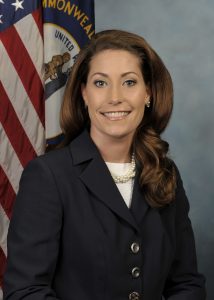
Photo: Secretary of State website
Kentucky Secretary of State Alison Lundergan Grimes on Monday led a unanimous group of her colleagues in reaffirming states’ constitutional rights to administer federal, state, and local elections.
The members of the National Association of Secretaries of State unanimously passed a bipartisan resolution in response to a letter they received from the Presidential Commission on Election Integrity. The resolution reiterates the responsibilities of states to run elections and the secretaries’ collective “commitment to strengthening election cybersecurity and processes, and increasing voter participation
The letter from the presidential commission requested secretaries turn over sensitive voter information, including party affiliation, voting history, and Social Security numbers. More than 40 states have said they will not comply fully with the request.
After many secretaries individually expressed concerns about the request potentially jeopardizing voter privacy and infringing on states’ ability to run elections, Grimes worked with a group of her colleagues at the association’s summer conference to put forth their concerns collectively.
“We each devoutly believe in the Constitutional responsibility states have in running elections, including maintaining voter registration,” Grimes said. “As chief election officials, we are resolute in our shared obligation to ensure our elections are free and fair and engender the trust of our citizens. That means reaffirming the rights of our states to run our elections and protecting voters from unwarranted risks to their personal, sensitive information.”
The National Association of Secretaries of State is the nation’s oldest, nonpartisan professional organization for public officials. Membership is open to the 50 states, the District of Columbia and all U.S. Territories. Forty of its members are their states’ chief election officials.
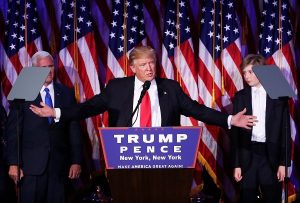 VOA News (New York, Washington) — Donald Trump will be the next president of the United States.
VOA News (New York, Washington) — Donald Trump will be the next president of the United States.
The billionaire businessman, who was widely underestimated and even mocked by the political and media class throughout his campaign, pulled off a stunning and decisive win Tuesday over his rival, ex-Secretary of State Hillary Clinton.
“I pledge to every citizen of our land to be a president for all Americans,” said an exuberant Trump, surrounded by his family and top aides at a victory party in New York City early Wednesday.
President Barack Obama congratulated Trump over the phone and invited the president-elect to meet with him at the White House on Thursday.
“Ensuring a smooth transition of power is one of the top priorities the President identified at the beginning of the year and a meeting with the President-elect is the next step,” Press Secretary Josh Earnest said.
First elective office
It is an improbable victory for a candidate who has never held elected office and who ran one of the most unorthodox campaigns in U.S. history. It also brings to an end one of the most contentious and divisive presidential campaigns in recent memory.
Trump, a Republican, captured at least 288 electoral votes compared with 215 for the Democrat Clinton, according to figures early Wednesday. Despite his strong electoral vote tally, Trump appeared to be headed for a narrow loss in the popular vote. It would be just the fourth time in U.S. history that the presidential winner has lost the popular vote.
At Trump headquarters, the scene was jubilant, though remnants of a divisive campaign were still evident. Even as it became clear that Trump would win, his supporters repeatedly broke out in chants of “lock her up,” referring to the Democratic nominee.
“There was tremendous excitement among Trump supporters to begin with, and it grew and grew as results started coming in,” says White House correspondent Mary Alice Salinas, who was at the Trump victory party. “Many Trump supporters say they aren’t surprised at the win — they knew the polls were better for Trump than many had expected.”
Investors reacted less positively, with global markets and U.S. stock futures sent into turmoil as it became clear Trump would win.
Polling failure
Trump’s victory amounts to a massive failure for opinion polls, which showed Clinton with a seemingly safe 3-4 point lead in the final days of the campaign. Many respected pollsters had put her odds of winning at more than 90 percent. Continue reading
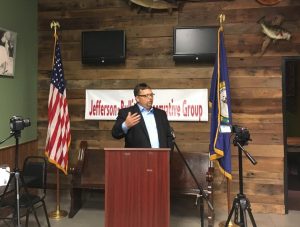 This week, three local candidates running for office held a town hall forum where they took questions from the voters. Michael Payne, Harold Bratcher, and Shane Ranschaert each had a turn at the microphone where they were able to talk not only about policies, but also about why they became involved in politics. All three candidates are running for office for the first time, and all three are unhappy with the state of politics in the Louisville area and felt that the best way to help the community is to become involved. With the election fast approaching and the Presidential race garnering so much attention, it can be easy to lose track of local races.
This week, three local candidates running for office held a town hall forum where they took questions from the voters. Michael Payne, Harold Bratcher, and Shane Ranschaert each had a turn at the microphone where they were able to talk not only about policies, but also about why they became involved in politics. All three candidates are running for office for the first time, and all three are unhappy with the state of politics in the Louisville area and felt that the best way to help the community is to become involved. With the election fast approaching and the Presidential race garnering so much attention, it can be easy to lose track of local races.
Harold Bratcher is running the US House of Representatives, District 3. District 3 in KY is all of Jefferson County, and therefore, all of Louisville. Representatives will go to Washington D.C. to represent all the citizens on Louisville in the United States Congress for a 2-year term. Bratcher graduated from Valley High School (class of 1991) and we worked for some trucking companies. He recently opened his own freight company and has been operating out of Louisville since 2013. Bratcher is running against incumbent John Yarmuth, who is seeking re-election for his sixth term.
Bratcher focused on three major talking points: supporting small business, preserving the Constitution, and immigration. Being a small business owner himself, Bratcher knows a lot about what is needed to run a small business. NAFTA and TPP have been brief topics in the recent presidential debates, but Bratcher has believed for years that NAFTA has negatively impacted this country’s economy and believes that the TPP will be just as bad, if not worse. “NAFTA cost a minimum of 1 million union, and non-union high paying manufacturing jobs,” he said, adding that this equals about 25% of the manufacturing capacity that was here previously. With the unemployment rate being as high as it is, he believes the answer is to invest in small business. “Giving $100 million to 100 small businesses will create more jobs than giving that money to one big corporation,” he said. He also proposes cutting taxes across the board, which he believes will create more jobs and by putting more money in consumer pockets, will result in more revenue in taxes.
Bratcher identified himself as a “Constitutional Conservative” and believes that government needs to be smaller and less involved in our everyday lives. He applies this to every Constitutional right, including the first and second amendments. He admitted that he is a new firearm enthusiast, but recognizes that the laws being proposed are already in place in some of the highest gun crime cities in the nation. “If the laws don’t work in Chicago, why would they work here,” he asked. He also believes that individual, civilian gun-ownership keeps America is safer as nation. Bratcher went on to talk about balancing the budget: “Everyone is concerned about the D and the R. This is why we have no balanced budget and this is why there is gridlock. I’m willing to work towards the middle, but it needs to be a give and take.”
Being the only candidate running for a federal office, Bratcher was the only one to talk about immigration. Bratcher understands that this is a country of immigrants and accepts immigrants who come to the United States legally. His first concern, however, is that we have millions of homeless Americans here and we should address that problem before trying to take on the task of helping other countries.
Michael Payne is running for State Representative, District 28. District 28 starts in the southern part of Pleasure Ridge Park and continues south along Dixie Highway to West Point, KY. State Representatives go to Frankfort, KY where, like the federal House of Representatives, they serve a 2 year-term where they represent a portion of Kentucky residents for state legislation. Payne is a graduate of Valley High School (class of 1990) and went on to study at both Sullivan University and University of Louisville. He has worked as an engineering specialist for UPS, an engineering manager for a local material handling firm, and currently works at Sullivan College as an instructor. Payne is running against incumbent Charles Miller, who is currently seeking re-election for his tenth term.
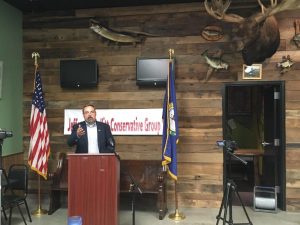 Payne focused on several major talking points: the economic depression, the education system, and crime. Payne believes that best way to address the economic issues is to attract new businesses into the state and Kentucky is having a hard time competing with the surrounding states. He stated that the best way to encourage investments into the state and to encourage entrepreneurs is to reform the tax code with a flat tax and improve the work force through training programs that promote hands on, technical skills.
Payne focused on several major talking points: the economic depression, the education system, and crime. Payne believes that best way to address the economic issues is to attract new businesses into the state and Kentucky is having a hard time competing with the surrounding states. He stated that the best way to encourage investments into the state and to encourage entrepreneurs is to reform the tax code with a flat tax and improve the work force through training programs that promote hands on, technical skills.
When it came to education, Payne said, “Don’t throw more money at the problems.” He feels that teachers are being prevented from doing the jobs because of curriculum standards as well as social standards. He believes teachers know best on how to teach their students and that the state needs to take a step back and allow them to teach. Further, Payne says that he would like to see subject matter experts within a field to be allowed to teach without the need for certifications. He feels that this would enable students to learn more and encourage critical thinking. As for higher education, Payne said tuition rates need to be frozen and universities need to start acting like the businesses that they are, not charities. Payne also believes that public universities should be opened up to accommodate concealed carry weapons for license holders on campus while private universities should be left to decide on this issue for themselves.
The heroin epidemic and the rising crime rate has effected everyone in the community. Payne believes that law enforcement needs to be given more ability to do what is needed, and that the judicial system needs to be able to sentence certain offenders more. While believing that dealers and other distributors need to be held accountable, he believes that there needs to be a “compassionate hand to the addicts”. Once in jail, rehabilitation programs need to start and programs need to be in place that allow the addicts access to affordable treatment when they leave jail.
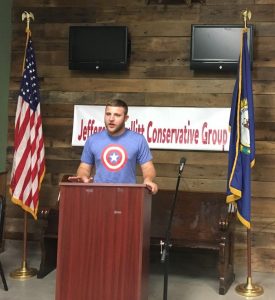 Shane Ranschaert is running for Metro Council, District 14. District 14 is in the far southwest portion of the county, including most of Valley Station west of Dixie Highway between Greenwood Rd and the Gene Snyder, south to include Valley Village, areas surrounding Jefferson Forest to the county line. Councilmembers stay in Louisville where they represent their district for a four-year term. Ranschaert is running against incumbent Cindi Fowler, who is seeking re-election for her second term.
Shane Ranschaert is running for Metro Council, District 14. District 14 is in the far southwest portion of the county, including most of Valley Station west of Dixie Highway between Greenwood Rd and the Gene Snyder, south to include Valley Village, areas surrounding Jefferson Forest to the county line. Councilmembers stay in Louisville where they represent their district for a four-year term. Ranschaert is running against incumbent Cindi Fowler, who is seeking re-election for her second term.
Ranschaert also had three talking points: adequate representation for the southwest portion of the city, taxes and regulations, and the rise in crime and heroin use. Ranschaert said he is tired of seeing Southwest Louisville ignored until election time and he wants to make sure that the residents of District 14 feel like they matter all the time, not just when politicians are seeking votes. Ranschaert explained that he would like to see taxes in the city cut, stating that Louisville is the third most taxed city in the US and one of the most regulated cities in the US. He wants to cut taxes and address infrastructure issues, such as the malfunctioning flood pumps along the Ohio River. He cited a similar plan to Payne’s for addressing the rise in heroin use and crime and wants police to be able to more effectively perform their duties, and wants to see task forces developed to utilize all local agencies to make Louisville as uncomfortable as possible for drug dealers. He also wants to see addicts being helped and treated and not just pushed through the system.
If you did not have the chance to attend the town hall, all the candidates have contact information on their websites and all three candidates have Facebook pages and welcome your questions. As with any election, it is important to be informed and voters should take the time to research the candidates before making a decision. A sample ballot for your location can be found on the Jefferson County Clerk’s website. The deadline to register to vote in this election cycle was October 11. If you are not registered to vote, you can still register, but you will be eligible to vote in the next May primary.
This Tuesday, October 18th at 6:30 PM, there will be a town hall forum that will have candidates Harold Bratcher and Michael Payne available to take questions from community members.
Bratcher is running for the US House of Representatives for Kentucky’s 3rd district. The House of Representatives is one of half of the legislative branch at the federal level. Each state has a different number of representatives that correlate to the population of that state. Each term in the House is 2 years. Bratcher is running for Kentucky’s third district, which represents all of Jefferson County. Bratcher is opposing incumbent John Yarmuth, who has held the office since 2007 and is currently seeking re-election for his sixth term. More information about Harold Bratcher can be found on his website.
Michael Payne is running for State Representative, District 28. As seen with Congress at the federal level, each state has their own two-part legislature. District 28 represents a portion of the southwestern portion of the county, from parts of Pleasure Ridge Park south along Dixie Highway to West Point, including Valley Station, Valley Village, and Prairie Village. Each term for the State representatives is 2 years. Payne is opposing incumbent Charles Miller, who has held the office since 1999 and is currently seeking re-election for his tenth term. More information about Michael Payne can be found on his website.
The forum is a town hall style, meaning community members who attend will be able to ask questions directly to the candidates. The meeting is at La Carretta at 10105 Dixie Highway (due to construction, people traveling south on Dixie Highway will find it easier to access the shopping center parking lot by turning left at Valley Station Road, and turning left into the shopping center). The meeting starts at 6:30 PM.
Since the current Governor of Indiana, Mike Pence, is running as Vice-President on the Republican ticket with Donald Trump, he is unable to run for re-election as Governor. A replacement candidate needed to be found.
22 members of the Indiana Republican State Committee held a meeting earlier this week to determine who would be the Republican candidate for Governor this year.The choice included big names, such as Lieutenant Governor Eric Holcomb, US Representative Susan Brooks, US Representative Todd Rokita and State Senator Jim Tomes.
The meeting lasted a few hours and the committee announced that Lt. Gov. Eric Holcomb will be the candidate this election cycle. The announcement did not surprise many since Governor Pence endorsed Holcomb last week. Holcomb has not named a running mate for Lieutenant Governor yet, but he will be running against:
- John Gregg (Democrat) with Christina Hale
- Rex Bell (Libertarian) with Karl Tatgenhorst
- Adam Adkins (Write-in) – no running mate named at this time
- Christopher Stried (Write-in) – no running mate named at this time
Gregg also ran in 2012 against Pence. Pence narrowly won that election with 49.5% of the vote (Gregg had 46.6% and Libertarian candidate Rupert Boneham had 4%). Polls from earlier this year show that Pence and Gregg were nearly tied, but Pence did have a slightly lead in May. It is unclear how close Holcomb and Gregg are at this time.
Brooks and Rokita both had to remove their names from the ballots for the US House of Representatives, but both intend to seek re-election in their districts. Both are still eligible to be placed on the ballot in November.
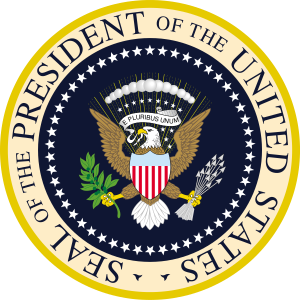 As of now, 111 of 120 Kentucky counties will participate in the Republican Presidential Caucus. The Caucus will be held on March 5, 2016. The Caucus will take place before the state’s primary elections, which will allow Senator Rand Paul to run for President as well as re-election for this Senate seat.
As of now, 111 of 120 Kentucky counties will participate in the Republican Presidential Caucus. The Caucus will be held on March 5, 2016. The Caucus will take place before the state’s primary elections, which will allow Senator Rand Paul to run for President as well as re-election for this Senate seat.
The last time Kentucky held a caucus was in 1984 and for many voters, this will be a new way to vote. On election day, voters will arrive at a location (to be announced in January) within their county between the hours of 10:00 A.M. and 4:00 P.M. Voters will see a table for each candidate with information, maybe a representative, about the candidate. When a voter is ready to cast their secret ballot, they will move to a voting area that will resemble a traditional voting booth.
Only registered Republicans will be able to participate in the Caucus. However, if you are currently 17 years old, but you will be 18 by November 8, 2016, you are eligible to vote in the caucus as long as your are registered as Republican, by December 31, 2015. If you live in one of the 9 counties that will not be participating, you will still have the opportunity to vote. You will be assigned a location in a nearby county, or you may vote by absentee ballot. Starting January 7, 2016, voters will be able to apply for an absentee ballot. Instructions will be available on the website for the Republican Party of Kentucky. Applications must be received by February 19, 2016 and completed ballots must be received by March 4, 2016. If you request an absentee ballot, you will not be eligible to vote in person.
After the ballots are counted, the delegates of Kentucky will be allocated proportionally to each candidate that receives at least 5% of the total votes. Candidates have until January 7, 2016 to file the necessary paperwork to appear on the ballot. As of now, the following candidates have already filed:
- Jeb Bush
- Ben Carson
- Chris Christie
- Ted Cruz
- Carly Fiorina
- John Kasich
- Rand Paul
- Marco Rubio
- Donald Trump
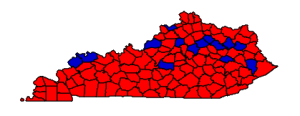 As of 10:16 PM today, 100% of the counties have reported their results. In Jefferson County, 193,875 ballots were cast for about a 35% turn out. This figure is slightly higher than the state average, although some counties had a turnout in excess of 40%. Throughout the Commonwealth, there are approximately 3.2 million registered voters. With just under 1 million ballots cast today, the 2015 elections saw a voter participation rate of 30.7% – slightly higher than the previous gubernatorial election of 2011. Fair autumn weather is thought to have played some part in this year’s increased turnout.
As of 10:16 PM today, 100% of the counties have reported their results. In Jefferson County, 193,875 ballots were cast for about a 35% turn out. This figure is slightly higher than the state average, although some counties had a turnout in excess of 40%. Throughout the Commonwealth, there are approximately 3.2 million registered voters. With just under 1 million ballots cast today, the 2015 elections saw a voter participation rate of 30.7% – slightly higher than the previous gubernatorial election of 2011. Fair autumn weather is thought to have played some part in this year’s increased turnout.
The state received 52 complaints of fraud throughout the day, with the highest concentration coming from Jefferson County, which tallied 13. Statewide, complaints included reports of polling place disruption, vote buying and selling, and electioneering.
2015 election results follow; winners are in blue: Continue reading
 Weather
Weather Traffic
Traffic @LouisvilleDispatch
@LouisvilleDispatch @LouisvilleDisp
@LouisvilleDisp Subscribe
Subscribe